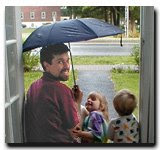Saturday, June 5 - Merrymeeting Bay Shoreline Cleanup, 12-2 pm, Abbagadassett Point in Bowdoinham or Butler Cover in Bath. Celebrate National River Month with Friends of Merrymeeting Bay for their annual Merrymeeting Bay Cleanup. This year volunteers will gather in two locations. Help your community by scouring the shoreline for trash; make this magnificent watershed even more beautiful. You can bring the kids too! Pre-registration is required. To register for the Bowdoinham cleanup please contact Helen Watts at 666-3920 or 522-9366. For the Bath cleanup please contact David Barber at 442-9335 or boatshop@gwi.net. Trash will be collected, documented and sorted for recycling and disposal. Please dress for the weather, wear sturdy footwear and bring work gloves.
Sunday, June 6 - FRESH the Movie, 4 pm, Colonial Theatre, Belfast. Premier screening of FRESH the Movie, followed by interactive talk on the topic of revving up the connections between traditional family farms and local consumers. Led by a panel including John Piotti, Executive Director, Maine Farmland Trust; Troy Nelson of Nelson Family Farm, a fifth generation cattle farmer in Palermo who sells his meat direct off the farm and at the Camden Farmers' Market; Dr. Joseph Anderson of Belfast Pediatrics, a local advocate of the 5-2-1-0 Initiative, which teaches and promotes the integration of healthy habits in every area of children's lives; Vyvenne Ritchie of Healthy Waldo County. Sponsored by Our Town Belfast (a Maine Downtown Network community organization), the Belfast Farmers' Market, Healthy Waldo County and the Belfast Co-op. Maine-made drinks and snacks. More about the film at freshthemovie.com. For more information or to purchase tickets contact Anne Saggese 338-0651
Tuesday, June 8 - Maine primaries and referendum. Don't forget to vote!
Tuesday, June 8 - Healthy Eating As A Vegan, Vegetarian or Omnivore, 6:30 - 8:30 pm, Barrel's Community Market, 74 Main Street, Waterville. Panel discussion hosted by the Sustain Mid-Maine Coalition. Cheryl Wixson, MOFGA's Organic Marketing Consultant, will serve as the omnivore panelist.
Wednesday, June 9 - Music Inspired by the Environment, 7-10 pm, Liberal Cup, Water Street, Hallowell. Join host Allison Wells and other Natural Resources Council of Maine staff for an open Mic Night. Bring your guitar, shakers, and your favorite environment-inspired songs, or just come, meet NRCM staff, and enjoy the friendly atmosphere and the Liberal Cup’s homemade English pub-style food and beverages. NRCM staff will be performing some of our own favorites – and inviting you to sing along! Admittance is free and open to the public. If you would like to perform a song, please email your song title and artist to beth@nrcm.org.
Tuesday, June 15 - Evening paddle on the Cathance River, 6:30-8:30 pm. Join Friends of Merrymeeting Bay member and kayak guide, Ian Ramsey, for an evening paddle on the Cathance River. To pre-register please contact Ian Ramsey at 751-7569.
Wednesday, June 16 - Sustainable Living Presentation, 6 - 8 pm, Falmouth Memorial Library, 5 Lunt Road, Falmouth. Dr. Catherine Elliott, Extension Specialist and co-author of "Living Sustainable: It’s Your Choice," will explore the concept of sustainable living, discussing three of the barriers to living sustainably in the United States and suggesting ways to overcome them. If you wish to adopt sustainable living practices, such as buying local foods, service, and products; spending more time outdoors; being more active; reducing carbon footprints; reducing use of toxic substances; living within your means and sharing rather than buying, or wish to reduce waste by reducing, reusing, recycling, repurposing, refusing, composting, or donating, this presentation is for you. Free and open to the public. UMaine Extension programs are open and accessible to all in accordance with program goals. For more information on the Tidewater Learning Center, to donate to the building campaign, to get involved or to learn about future events, visit: www.extension.umaine.edu/tidewater/ or call 780-4213.
Friday, June 18 - LL Bean Green Expo, 10 am - 4 pm, LL Bean, Freeport. Visit LL Bean's flagship store in Freeport for a day of green events. See "The Big Green Bus," a bus that runs on waste vegetable oil; learn about "Bean Green," LL Bean’s commitment to environmental stewardship; try "Greening your Home," with representatives from Efficiency Maine, Revision Energy, and Sunrise Guide; watch "Local Sustainability: Maine Roundtable," a multi-media presentation by The Green Living Project showcasing sustainability-related projects in Maine; and enjoy a "Pedal Power Smoothie," whipped up by a bicycle-powered blender.
Saturday, June 19 - Cathance River Education Alliance 10 Year Anniversary, Wild Duck Pub, Highland Green. Celebrate a decade of CREA with hikes, golf, games, a band, cookout, and ecology center tours. Speakers: John Rensenbrink, John Wasileski, Rick Wilson, and Angela Twitchell, Executive Director of the Brunswick-Topsham Land Trust. For more information, visit creamaine.org.
Friday, June 25 - Meet Your Farmer premier, 6 - 9:30 pm, Strand Theatre, Rockland. Eight short documentaries by filmmakers Cecily Pingree and Jason Mann tell the diverse stories of eight Maine farms: from Aroostook to York, from potatoes to dairy, from large commercial operations to small farms that sell directly to local people. Farm-Fresh Food from 6:00-7:15 pm. 7:15 pm doors open. 7:30 pm films start with commentary and Q&A. 9:00-9:30 pm: Coffee and Chocolates. Tickets: For the entire event - $20 for Maine Farmland Trust members; $25 for non-members. Film and coffee reception (doors open at 7:15) - $10. Purchase tickets through Maine Farmland Trust by calling 338-6575 or by emailing Anna Abaldo
Friday, July 2 to Sunday, July 4 - Northeast Permaculture Convergence, MOFGA Common Ground Education Center, Unity. The 6th Annual Northeast Permaculture Convergence hopes to continue the tradition of bringing the permaculture community together to share, learn, collaborate and celebrate. For more information, please visit northeastconvergence.wordpress.com.
Local permaculture groups in Brunswick and Portland have several events planned. You can learn more about these groups and their events using the Meetup web service. Check them out at

